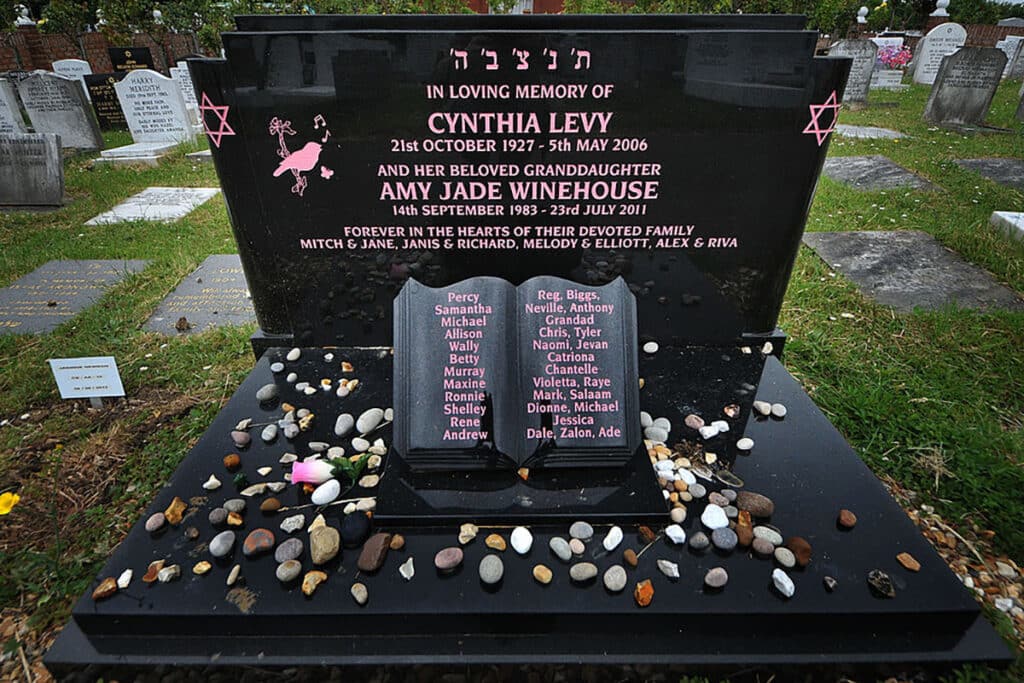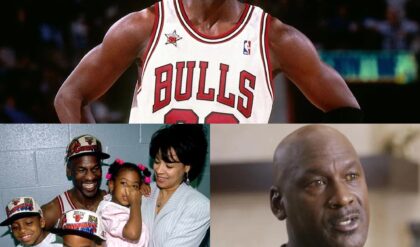Long before Amy Winehouse emerged as a renowned, iconic, and inspiring artist, she was just a Jewish girl from North London.
At least that’s how she described herself in an early journal entry, writing:
“When I was a little kid it was my dream to go to drama school, but it was never something I thought would happen to me…I was a Jewish girl from North London, and things like that don’t happen to Jewish girls from North London called Amy Winehouse.”
Like many young Jewish kids, Winehouse — who tragically passed away at 27 — hated Hebrew school and only prayed on Yom Kippur. She also had a tattoo of her Jewish grandmother Cynthia on her arm and performed with a signature Star of David around her neck.
In many ways, the nuances of Winehouse’s Jewish identity provide a quiet yet profound backdrop to her life and legacy.
The release of the first full trailer for “Back to Black,” the new Amy Winehouse biopic set to premiere in April 2024, has sparked renewed interest in the British singer’s identity, including her Jewish heritage.
Scenes featuring Marisa Abela as Winehouse wearing a big gold Star of David necklace nearly identical to the one worn by the singer herself have drawn attention to how her Jewish background influenced her music, style, and values.
Here’s a closer look at everything we know about Amy Winehouse’s Jewish identity.
She grew up as a secular Jew in North London
Amy Jade Winehouse was born on September 14, 1983, at Chase Farm Hospital in Enfield, London, to Jewish parents.
She grew up in Southgate, a neighborhood in North London, with her mother Janis, father Mitch, and older brother Alex.
Her mom was a pharmacist, and her dad a window panel installer and taxi driver.
Amy attended Osidge Elementary School and then secondary at Ashmole School.
Winehouse also attended Jewish school
She attended nursery school at Yavneh School, which was part of the Southgate Synagogue community, and later Hebrew school every Sunday.
In an interview, Winehouse recalled how much she disliked Hebrew school, explaining that she would beg her dad to let her skip it.
Unpacking Israel at war
All the answers you’re looking for in one place
LEARN MORE →
“I never learnt anything about being Jewish when I went anyway,” she added.
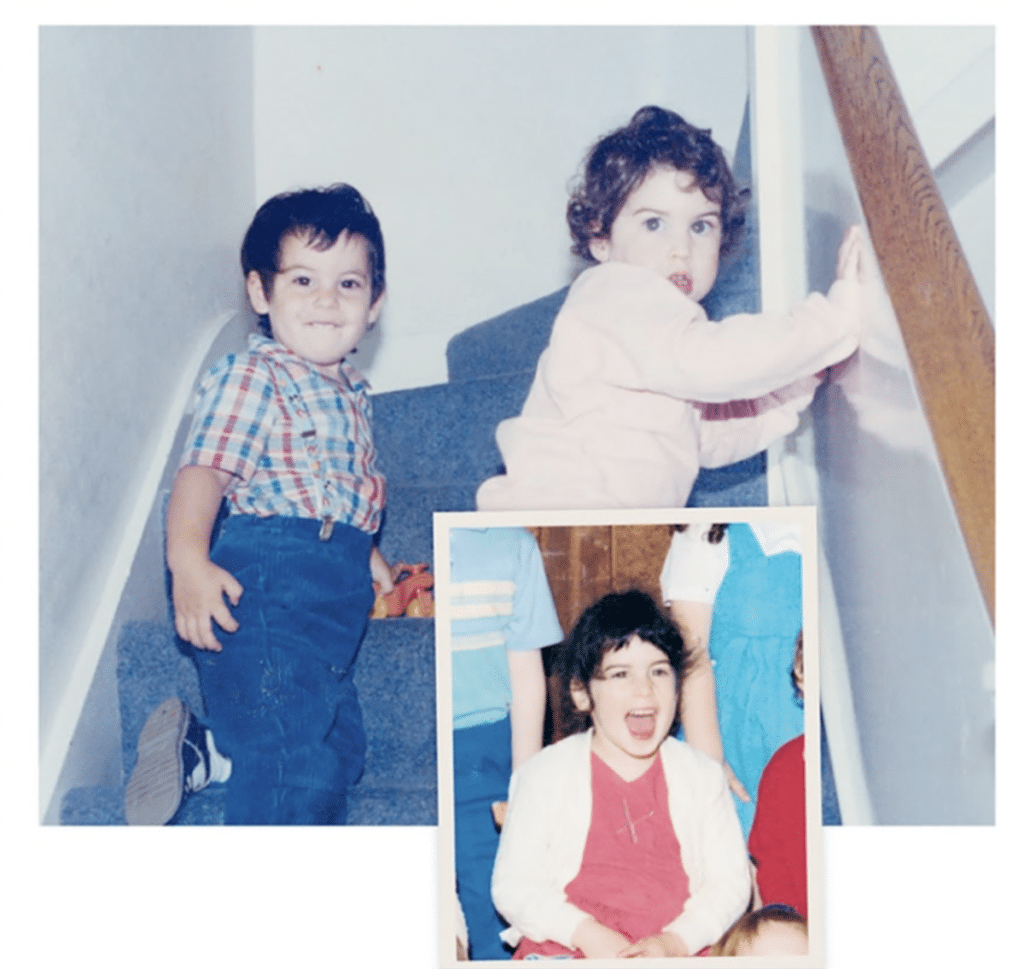
Her last name was originally ‘Weinhause’
Winehouse’s paternal family, originally spelled Wienhause, immigrated to England from Belarus in the late 19th century and settled in London’s East End. Both her mother and father’s side of the family were Ashkenazi Jews.
Her great-great-grandfather Harris Winehouse arrived in London in 1891.
Though the Winehouses were not particularly religious, they had a strong Jewish cultural identity, participating in traditions like celebrating Passover and getting together for weekly Shabbat dinners, according to the Jewish Museum London.
Many of Amy’s family members were musically inclined, which influenced her artistic development. She was especially close with her grandmother Cynthia Winehouse, who inspired her love for music and fashion.
She would bring friends to her family’s weekly Shabbat dinners
In Mitch Winehouse’s memoir “Amy, My Daughter,” her dad wrote that Amy would sometimes bring friends along to the family’s weekly Shabbat dinners.
Winehouse’s first manager, Nick Shymansky, told the Los Angeles Jewish Journal that he attended Friday night dinners at Winehouse’s grandmother’s home with Amy.
She was a “High Holiday Jew”
Winehouse reportedly said she attended synagogue once a year on Yom Kippur “out of respect.”
Like many secular Jews, her Jewish identity seemed to have been connected to family and cultural traditions rather than religious observance.
She described her connection with her faith in an interview with The Guardian: “You know, I’m not religious, but there is nothing more pure than the relationship you have with your God — there is nothing stronger than that apart from your love of music.”
Amy also embraced her own Jewishness, saying, “Being Jewish to me is about being together as a real family. It’s not about lighting candles and saying a bracha.”
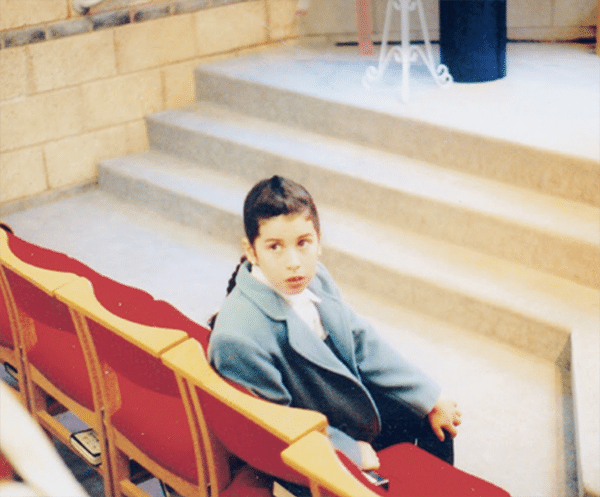
The Jewish Museum London dedicated an exhibit to her
In 2013, the Jewish Museum London ran an exhibition titled “Amy Winehouse: A Family Portrait,” tracing the singer’s family history and Jewish identity.
Amy’s older brother Alex contributed most of the exhibits and collaborated with the curator.
Alex, who is featured in many of the photographs and family stories, also wrote most of the exhibition’s captions. In the opening caption describing the exhibition, he wrote that it was a “snapshot of a girl who was, to her deepest core, simply a little Jewish kid from North London with a big talent who, more than anything, just wanted to be true to her heritage.”
The exhibition caused some controversy, with some critics arguing that it exaggerated Winehouse’s connection to her religion, remembering Winehouse as “the Jew she was not.”
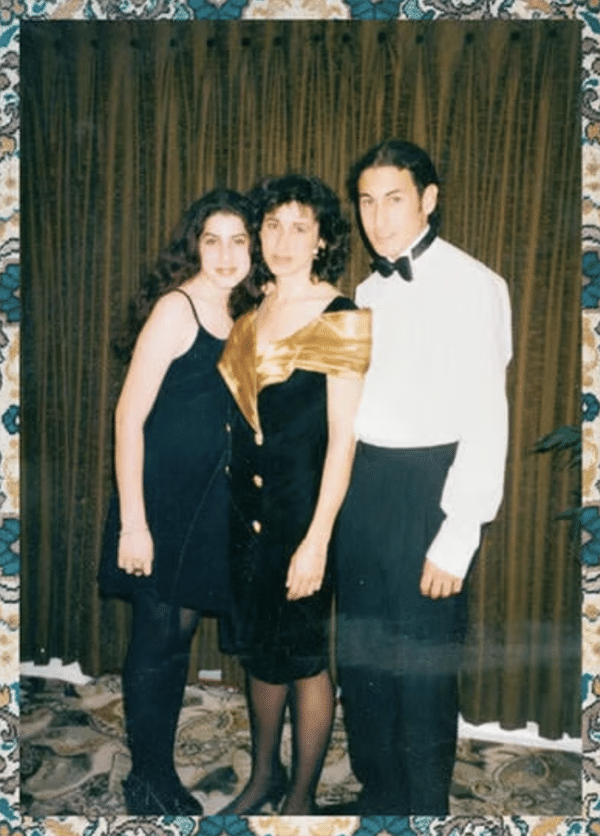
She wore a Magen David necklace
As featured in the “Back to Black” trailer, Winehouse was known to frequently wear a Star of David pendant around her neck.
In fact, she is depicted wearing a Star of David in her London tribute statue
A bronze statue of Winehouse adorned with a Star of David necklace can be found in Camden Town, London, a tribute to the singer and her Jewish heritage. She was a Londoner through and through, and famously loved the Camden neighborhood, where she lived until her passing.
The 5-foot-9-tall statue depicts Winehouse with her hand on her hip, wearing high heels, and sporting her signature beehive hairstyle. The statue also prominently features a Star of David necklace.
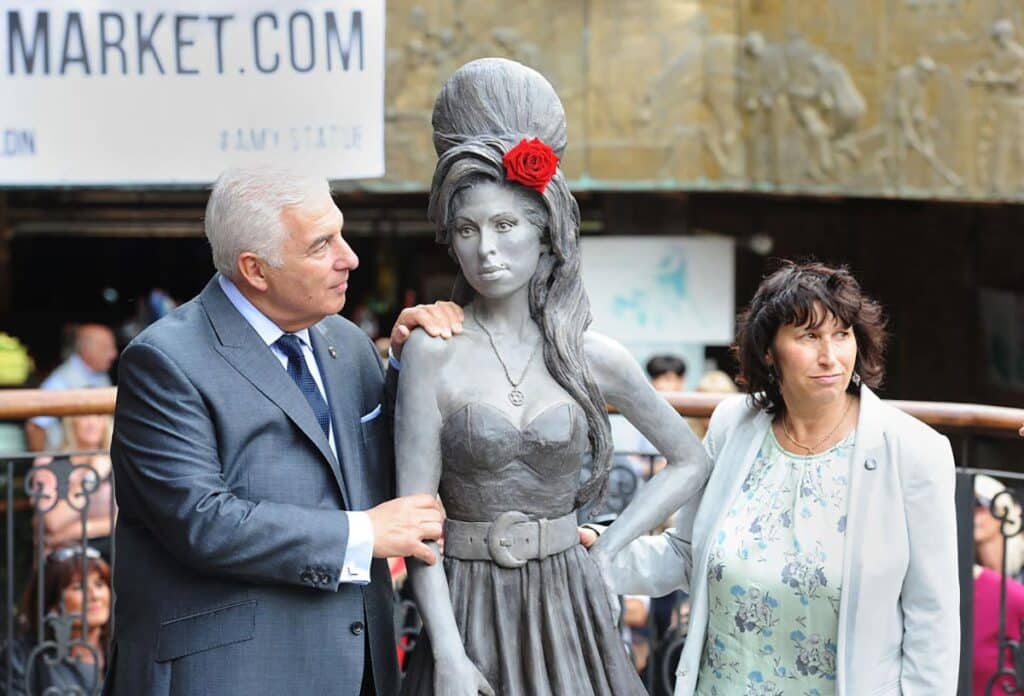
In February 2024, Winehouse’s statue was vandalized with a Palestinian flag. In response to the vandalism, Mitch Winehouse said in an interview, “Amy would have had the chance to be a unifying force,” referring to the Israeli-Palestinian conflict.
In some ways, Jewishness inspired her love of music
From a young age, Jewish music influenced her musical development.
According to “Amy Winehouse: In Her Words,” a scrapbook compiled by her family of the singer’s diary entries, notes, photos, poetry and lyrics, Amy could recite lyrics and sing tunes after hearing a song just once or twice.
She loved the Hanukkah song “Ma’oz Tzur,” and was influenced by the music her grandmother Cynthia played, which ranged from jazz legends to Jewish classics.
“Music also seeped effortlessly into Amy’s consciousness… At her nan Cynthia’s house she was surrounded by jazz music: anyone from Frank Sinatra to Ella Fitzgerald to Sarah Vaughan,” the family recounted in the book.
“At home she performed songs from the musical ‘Mary Poppins’ or Jewish hymns that we’d taught her. She repeated one hymn, ‘Maʼoz Tzur’, over and over until she got it right. ‘Okay, Amy. Enough,’ was a familiar expression in our house as she sang continuously at the top of her voice.”
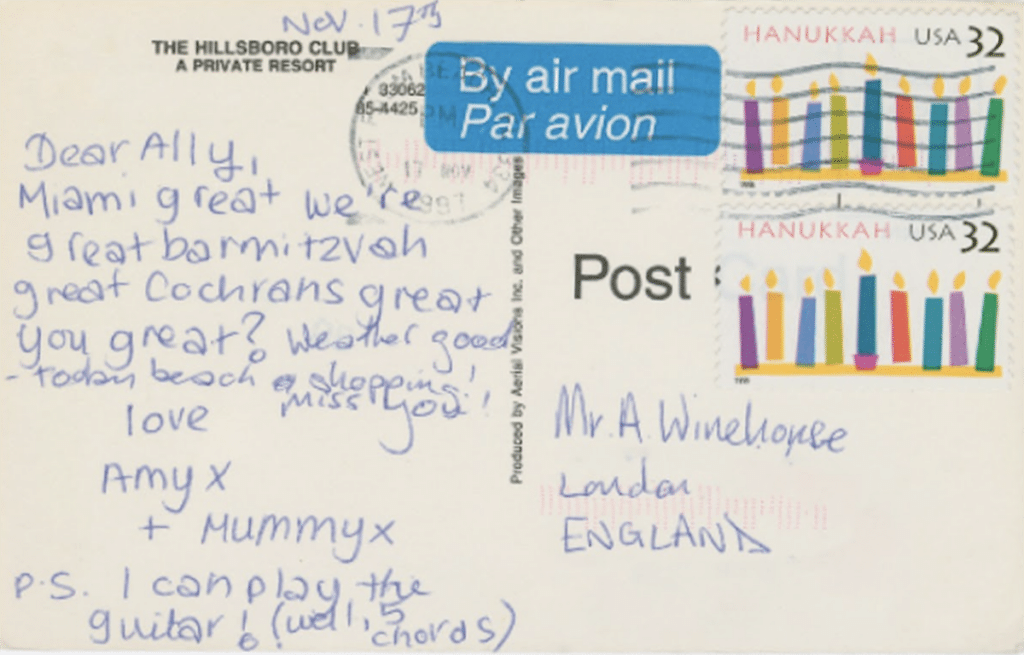
She connected with Jewish producer Mark Ronson
Winehouse collaborated with fellow British-Jewish artist and producer Mark Ronson on some of her most famous works, including “Rehab,” which emerged unexpectedly out of a conversation between the two.
“Ronson also seemed to give her the creative freedom she needed. A Jewish boy originally from North London, Amy felt an affinity with him and responded to his quietly spoken manner which allowed her to flourish,” according to “Amy Winehouse: In Her Words.”
Ronson would go on to win eight Grammy Awards after winning Producer of the Year for Winehouse’s album “Back to Black.”
She believed in the importance of Jewish representation in entertainment
In some interviews, Winehouse shared her belief that Jewish identities were not adequately represented in theater or music.
“There was no one like me, a Jewish girl who sings jazz,” Amy reportedly said in a 2006 interview.
Perhaps, she would have been pleased to learn that the actress portraying her in “Back to Black” is also a Jewish girl from the U.K.
Marisa Abela, who plays Amy in the biopic, is also Jewish
The decision to cast a Jewish actress to play Amy Winehouse in “Back to Black” was important to the film’s creative team to authentically portray Winehouse’s own background, according to British Vogue.
Read more: Everything we know about Marisa Abela’s Jewish identity
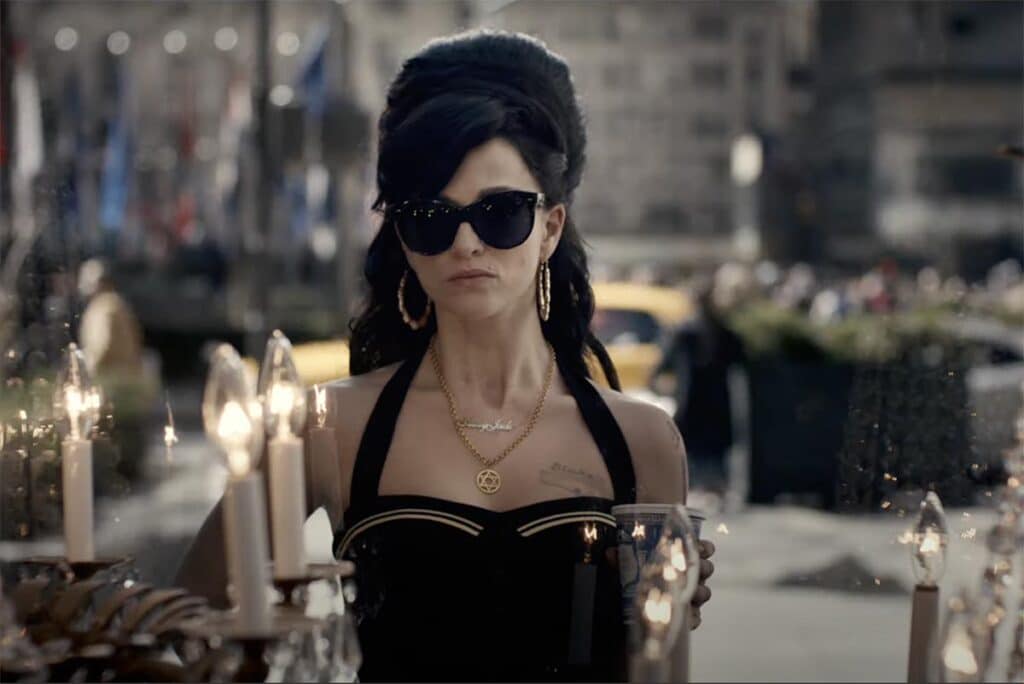
Amy is buried in a Jewish cemetery in North London
Winehouse’s burial in Edgwarebury Lane Cemetery followed traditional Jewish customs.
Her gravestone features a tribute to her beloved grandmother, Cynthia, who passed away five years prior to Amy, and is engraved with pink lettering, music notes and Magen Davids (Stars of David).
